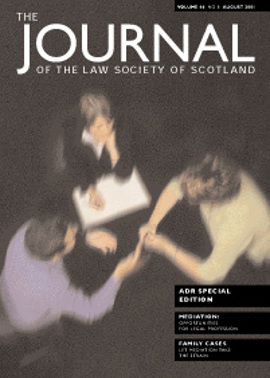President’s report
I was privileged to accompany Jim Wallace, Scotland’s Justice Minister and Deputy First Minister, who led the British Council delegation to Beijing and Hong Kong in July.
We were in Beijing as guests of the Chinese Ministry of Justice. The visit was at the invitation of China following on a visit from the Chinese Ministry of Justice Scotland earlier this year.
At first it seemed strange that China, with its huge population, (the number of people in Beijing alone is double that in Scotland) could have anything in common with us, but whilst fundamental differences were very apparent, there were areas where information could be shared and experiences discussed. The Chinese seem to be intrigued with the fact that Scotland has a different legal system from the rest of the United Kingdom and now its own parliament. China has Self Administered Regions (SARs) in Hong Kong and Macau and the phrase that we heard often in connection with these was “one country, two systems”. The Chinese were interested in comparing our experiences with theirs. They had specific interests in discussing certain matters - juvenile justice, resettlement of offenders, regulation of lawyers and the continuing development of the rule of law in China. In all of those areas we had a great deal to contribute and welcomed the discussion and the debate which followed.
When we were in Hong Kong, the decision to hold the 2008 Olympic Games in Beijing was announced and it is clear that there will be huge developments in China over the next decade. The law is set to develop and one of the principal areas will be in business law. Companies doing business in the country will need certainty in commercial activity and that is where the legal framework and the legal profession are so important. We visited the office of the All China Lawyers’ Association, which regulates the profession and which is under the jurisdiction of the Ministry of Justice. We also went to East Associates which was the first legal firm established in the Peoples Republic of China. It is only six or seven years old and indeed the profession, as we would recognise it, has only existed for twenty years or so.
It will be interesting to watch developments because what was underlined to me was the importance of an independent legal profession and its place in any developed society. The Chinese have made huge strides but an independent legal system does not yet exist and as matters develop there must be situations where the Government will need to be challenged. Sometimes we forget to appreciate what we have and our Justice Minister was able to tell the Chinese about challenges he has faced in such matters as temporary sheriffs and prison conditions.
I think that these issues would be almost impossible to raise if the Scottish legal profession was not independent and proudly so. Involvement with China is challenging and there is always the huge issue of human rights to be considered. Jim Wallace didn’t shirk from raising the subject and I think it is right that lawyers throughout the world have dialogue with each other, especially on controversial issues. The rule of law should be universal and can only reach full maturity where lawyers can operate independently from the state.
The international debate about MDPs continues and the opinion of the Advocate-General in the Nova case in the European Court of Justice may have significant consequences for Scotland. Although the court’s final decision is awaited, many hope it will follow the thrust of the Advocate-General’s conclusions and vindicate the Dutch Bar’s position of not permitting MDPs - a view which mirrors the Society’s own policy.
I don’t want to dwell on this but I do wonder if the debate on MDPs has masked an extremely important problem for firms in Scotland and that is their inability to form multi-national partnerships or MNPs.
Legislative change is required before this is possible and I hope that the Scottish Executive will recognise that need as a priority and essential if Scottish firms are to retain their competitive edge in international business.
Much of my role involves communication. The more I meet solicitors, whether Scottish or not, the more I am reminded of the importance of sharing information, listening and learning. Many Scottish solicitors have latched on to the benefits of good communication and one of the developing areas of law which involves solicitors assisting their clients to communicate is mediation.
Mediation is by no means the easy way out, but it can be the most constructive to tackle a problem for clients. Increasing numbers of solicitors are training as mediators or referring disputes to trained mediators after discovering the benefits it can bring clients. It is now increasingly popular with those who are prepared to resolve a dispute rather than fight it out. I commend the articles on mediation in this month’s Journal to you and look forward to watching developments in this exciting area of practice.






